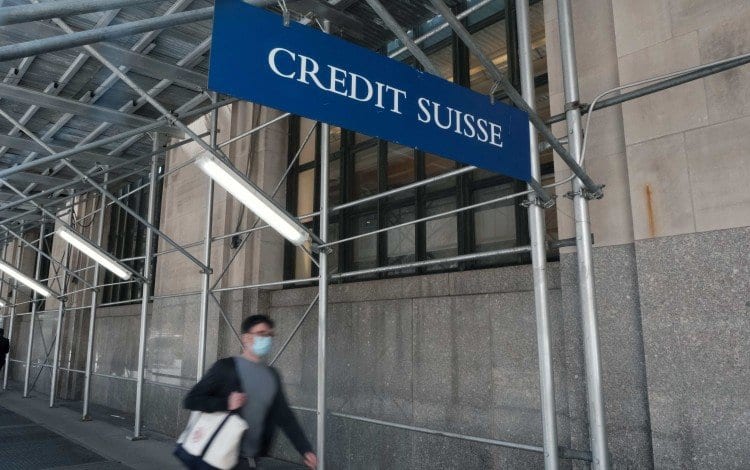
It was urgent to act in order to avoid disaster.
Four days after U.S. regulators unveiled an emergency plan to avert contagion from the collapse of Silicon Valley Bank, Europe has found itself in turn with a huge headache threatening to shake its financial system.
Credit Suisse, a former European banking flagship, which has been involved in almost every scandal affecting the banking world over the past three years was on the brink, assailed by investors doubting its financial solidity.
On March 15, the bank's shares had fallen nearly 30% to a new all-time low.
Credit Suisse's credit default swaps (CDS), a form of insurance for bondholders, jumped to new record highs. This meant that investors holding the bank's debt had to pay a lot more to insure themselves in the event that Credit Suisse cannot repay them. When the cost of CDS rises sharply, it suggests that investors clearly doubt that the company will be able to honor its debts.
The Swiss Regulators Step In
Investors were reacting to the fact that Saudi National Bank, the largest shareholder of Credit Suisse, had indicated that it would no longer increase its stake in the Swiss bank for regulatory reasons. Saudi National Bank does not want to exceed the threshold of 10%, which would subject it to stricter supervision by regulators both at home and in Switzerland.
Saudi National Bank Chairman Ammar Al Khudairy was asked by Bloomberg TV on March 15 whether his company was open to further injections if there was another call for additional liquidity.
"The answer is absolutely not, for many reasons outside the simplest reason, which is regulatory and statutory," Al Khudairy said, definitively ruling out the possibility.
Saudi National Bank, which is 37% owned by the sovereign wealth fund of Saudi Arabia, became the first shareholder of Credit Suisse as part of a capital increase operation at the end of last year.
Saudi National Bank had acquired 9.9% of the capital in exchange for an investment of 1.4 billion Swiss francs. But in just a few months, the value of this stake has already diminished by more than $500 million.
Faced with a situation that threatened to worsen, the Swiss authorities had to intervene. The first gesture came in the form of a joint press release from FINMA, the Swiss Financial Market Supervisory Authority, and The Swiss National Central Bank (SNB).
The two regulators asserted that they would provide liquidity to Credit Suisse if necessary, and reaffirmed that the firm, a Swiss national treasure, was a systemic bank for the country. Basically they couldn't let the bank down.
"If necessary, the SNB will provide CS with liquidity,' the two regulators said.
Credit Suisse Will Borrow $54 Billion
A few hours later, in the middle of the night in Switzerland, the SNB took action. Credit Suisse has announced that it will borrow 50 billion Swiss francs, equivalent of nearly $54 billion, from the Swiss National Bank intended to strengthen its liquidity. Credit Suisse said that the loan was fully collateralized by "high quality assets."
"This additional liquidity would support Credit Suisse’s core businesses and clients as Credit Suisse takes the necessary steps to create a simpler and more focused bank built around client needs," the bank said.
CEO Ulrich Koerner also wanted to be reassuring.
"These measures demonstrate decisive action to strengthen Credit Suisse as we continue our strategic transformation to deliver value to our clients and other stakeholders," Koerner said. "We thank the SNB and FINMA as we execute our strategic transformation. My team and I are resolved to move forward rapidly to deliver a simpler and more focused bank built around client needs.”
Credit Suisse also wanted to differentiate itself from Silicon Valley Bank, which had bet on interest rates without hedging the risks.
SVB (SIVB) indeed had a large portfolio of bonds acquired when interest rates were low but had not taken any hedge in case interest rates rose. And that's what happened, causing the Santa Clara, California-based bank to lose $1.8 billion.
However, its customers, mostly startups that burn a lot of cash, needed to dip into their deposits to finance their operations and stay afloat. SVB was unable to meet multiple withdrawal requests, prompting regulators to shut down the bank.
Credit Suisse "is conservatively positioned against interest rate risks," the bank said, adding that the "volume of duration fixed income securities is not material" compared to its portfolio of high quality liquid assets such as Treasurys and German bunds.
The bank also said that it is "fully hedged for moves in interest rates."
All of these announcements were well received by investors as Credit Suisse shares rebounded nearly 23% on the Zurich Stock Exchange at the time of writing.







